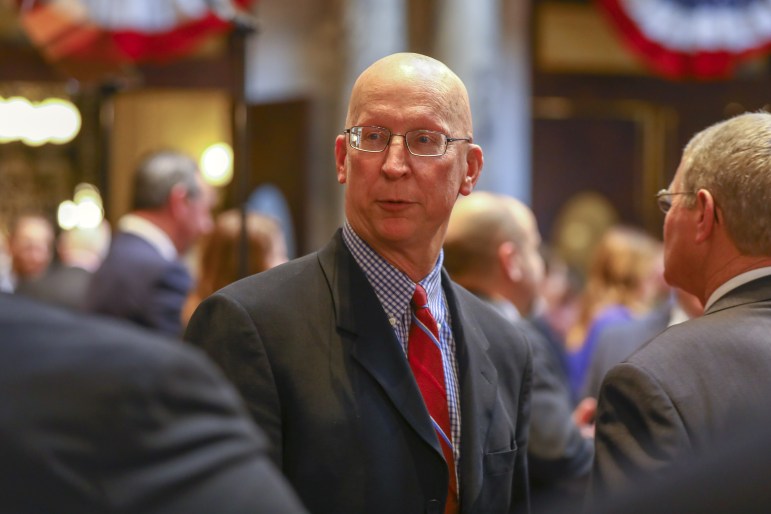Republicans Hide Details on Stewardship Fund
Legislators reduce project grant without revealing who objected or what exactly is funded.
The Wisconsin Legislature’s powerful Joint Finance Committee (JFC) on Wednesday approved providing $400,000 to the Town of Grand Chute through the state’s Knowles-Nelson Stewardship program to rehabilitate and trail and boardwalk in a local park.
The funds approved are far less than what was initially requested by the town, highlighting an ongoing disagreement in the Legislature about the process by which the stewardship program is run and the committee’s members’ ability to anonymously put a hold on spending.
Grand Chute had initially requested $663,737 for the project, but after an objection, the full committee had to vote on its approval. The Republicans on the committee proposed the lesser amount of $400,000 and that motion passed unanimously in a 14-0 vote.
Rep. Evan Goyke (D-Milwaukee), questioned how the Republicans in control of the process came up with that number.
“How did we come up with $400,000? What’s that gonna fund?” he asked, trying to determine which parts of the itemized initial proposal were being eliminated.
Sen. Howard Marklein (R-Spring Green), the committee’s co-chair, replied only that the $400,000 will “fund roughly two-thirds of the request.”
Goyke has often complained about the ways Republicans run the committee, which also holds significant power over the state budget, by limiting discussion and transparency.
“Right, what two-thirds? One of you guys, I didn’t object to this, one of the 12 of the Republicans on this committee did,” Goyke said. “The motion we had was an itemed, line by line total. Who came up with this? What is the community not getting in the project? Somebody came up with this number, I’m curious who and how.”
Sen. Duey Stroebel (R-Saukville) replied that because the boardwalk project was a “rehabilitation” and not the acquisition and development of recreational property that the stewardship program aims to support committee members had an objection so after conversations with the legislators who represent the town, the $400,000 was decided upon.
Goyke said he appreciated the transparency, but continued to express his frustrations at how the process plays out.
“This is the pattern, an objection is filed anonymously, stuff is happening somewhere in this building between people we don’t know, a number is pulled out of a hat and Grand Chute is given the opportunity to take $400,000 or take zero,” Goyke said. “It’s really frustrating that this process happens like this. I’m sure it’s frustrating for Grand Chute and their representative and senator, it’s certainly frustrating as a minority party member of this committee to have a three-sentence motion that doesn’t have an itemization of what the $400,000 is going to be. I wish the process of this committee handling these stewardship grants was far improved, less secretive, more transparent.”
Rep. Mark Born (R-Beaver Dam), the body’s other co-chair, replied that this is how the process should work.
Outside the committee room, other legislators have complained about the way the stewardship program has been repeatedly held up by JFC members. Rep. Alex Joers (D-Middleton) noted in a news release that 27 programs have run into anonymous objections since 2019. Joers has pushed for the Legislature to approve a provision in Gov. Tony Evers’ budget that would require those objections to include the name of the legislator and the reasoning behind the objection.
“Anonymous objections have been weaponized many times by the Republican majority, leaving conservation projects stalled that could result in indefinite delay endangering these projects all together,” Joers said in a statement. “It is reasonable for members to want to review and address concerns with projects that come before the Legislature. However, the objector should be public and constituents should know why that legislator needs to pause the review process. That’s putting common-sense over meaningless obstruction. Let’s ensure the timely and transparent approval of needed stewardship projects in Wisconsin so future generations can continue to benefit from the great natural spaces our state has to offer.”
Joint Finance approves stewardship funds amid ongoing complaints about process, delays was originally published by the Wisconsin Examiner.






















Without on the record votes for issues related to the Stewardship Fund, I think voters could assume that there are payoffs by special interests who want to block projects on behalf of some party who will gain financially. The Cedar Bluffs Project in Port Washington was initially stopped by some unknown legislator because some one wanted to build homes on the property. From the optics, a reasonable person could conclude that there was some type of payoff here. I guess the appearance of corruption is not a problem for Republican legislators.
@ Mingus – regarding the Cedar Bluffs project, note that JFC member Sen. Duey Stroebel, who’s house and senate district is only a couple miles from Cedar Bluffs, is a real estate developer. Feel free to draw your own conclusions who probably objected to that project.